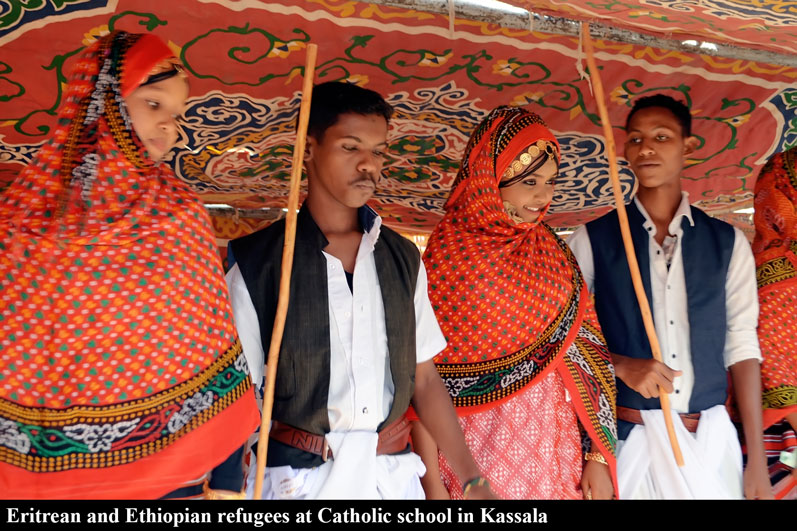ERITREA
The historic peace agreement with Ethiopia brings new hope to the region
Following the historic visit to Addis Ababa by an Eritrean delegation last month, it was announced that the Ethiopian prime minister, Abiy Ahmed, would soon meet Eritrean president Isaias Afwerki. Last weekend, streets in the Eritrean capital Asmara were lined with Ethiopian and Eritrean flags and banners welcoming Abiy on his historic visit to the country.
“Flags are lining the main streets. Banners in English, Tigrinya, Amharic, and Oromiya are going up. There’s an air of excitement. What an interesting time to be in #Asmara. #Eritrea #Ethiopia “ tweeted the US Chief of Mission in Asmara, Natalie E. Brown. Amharic is the official language of Ethiopia while Tigrigna is one of the languages spoken in Eritrea. Abiy who is Oromo is fluent in all four languages.
Several other social media users posted pictures showing roads, junctions and other key landmarks in Asmara adorned by the Ethiopian and Eritrean flags. Eritrean Government institutions asked their employees to come out to the streets of Asmara at 7:30 am local time on Sunday to welcome the Ethiopian Prime Minister.
Prime Minister Abiy returned to Addis Ababa on Monday (July 9) after a two-day official visit to Asmara, where he was warmly received by the government and people of Eritrea. At the end of the visit, the two leaders signed a five-point agreement ending the twenty-year war and restoring relations between them. The summaries read as follows:
The state of war has ended
The 2 nations will forge close political, economic, social, cultural & security cooperation
Trade, economic and diplomatic ties will resume
The boundary decision will be implemented
Both nations will work on regional peace
The “State of war that existed between the two countries has come to an end,” Eritrea’s information minister, Yemane Gebremeskel, wrote on Twitter. Landlocked Ethiopia wants to make the re-opening of two roads connecting it to two of Eritrea’s Red Sea ports a priority in the two nations’ reconciliation process, a government spokesman said on Wednesday.
“In the midst of so many conflicts, it’s necessary to point out an initiative that one can describe as historic — and one can also say that it’s good news: after 20 years, these days the governments of Ethiopia and Eritrea have begun to talk of peace again together,” rejoiced Pope Francis.
The Catholic Bishops Conference of Ethiopia has welcomed the peace agreement. Speaking on the behalf of the Conference, Cardinal Berhaneyesus said it was a happy day for Catholics of the two countries.
“I thank the Catholic faithful in Ethiopia and Eritrea and those who are in the diaspora for continuously praying for peace. I would like to congratulate them for we have received an answer to our prayers. This is the first step to sustainable peace, and I ask you to continue praying that with God’s grace this initiative may be successful. I invite all the Catholic faithful in both countries to pray for the governments of both countries that God may lead and bless the discussions they are holding to resolve the problems,” the Cardinal said.
Berhaneyesus said the Catholic Church served as a bridge during the war. Despite tremendous difficulties, the Assembly of Catholic Bishops of Ethiopia and Eritrea continued to meet and exchange notes on the pastoral concerns of the two conflicting countries. He believes that the two governments have the capability to solve their own problems as both had contributed a lot in peacebuilding in other countries.
The Chairperson of the Commission of the African Union, Moussa Faki Mahamat, welcomed the Joint Declaration signed by President Isaias Afwerki and Prime Minister Abiy Ahmed in Asmara. He praised the two leaders for choosing the courageous path of reconciliation, in the interest of their people, the region and Africa as a whole. He reiterated that the African Union was ready to accompany Eritrea and Ethiopia in whatever way they deem appropriate, as they implement the process of normalizing their relations.
Mahamat emphasised that the peace process between Eritrea and Ethiopia is a milestone in Africa’s efforts to silence the guns by 2020 and was a boost for peace and security in the Horn of Africa and on the continent as a whole. “This example is worthy of emulation by all parties to conflicts and crises in other parts of the continent. Consequently, the Chairperson looks forward to renewed efforts by all concerned with the view to overcoming protracted conflicts and defusing existing tensions,” he stated.
The African Union’s (AU) view is also shared by the European Union (EU). Both blocs issued statements on Monday congratulating leaders of Ethiopia and Eritrea – Prime Minister Abiy Ahmed and President Isaias Afwerki, for resolving to establish friendly “Breaking a twenty-year-old deadlock in bilateral relations, it raises unprecedented prospects for reconciliation and paves the way for enhanced regional cooperation and stability in the Horn of Africa,” said the EU statement issued by foreign affairs chief Federica Mogherini.
Ethiopia and Eritrea waged a border war between 1998 and 2000, though skirmishes occurred before and after, most recently in 2016. Although both countries are amongst the poorest in the Horn of Africa, they have spent hundreds of millions of dollars in weapons. Tens of thousands are thought to have died in the war, but the exact figure is not known.
ACN Malta





